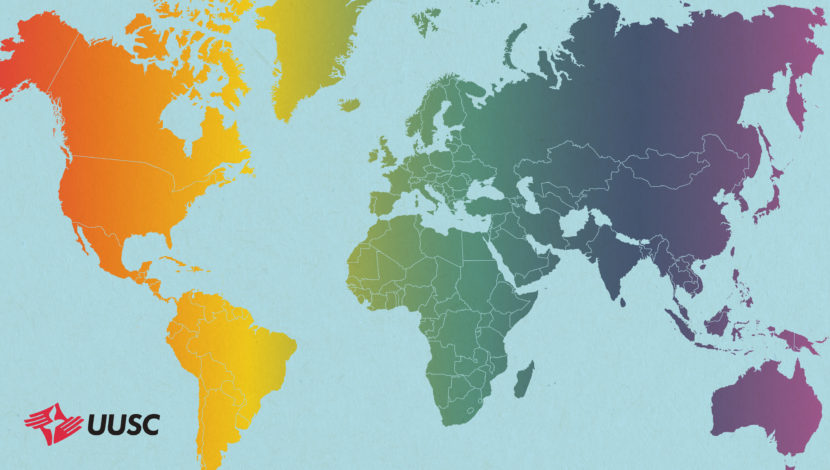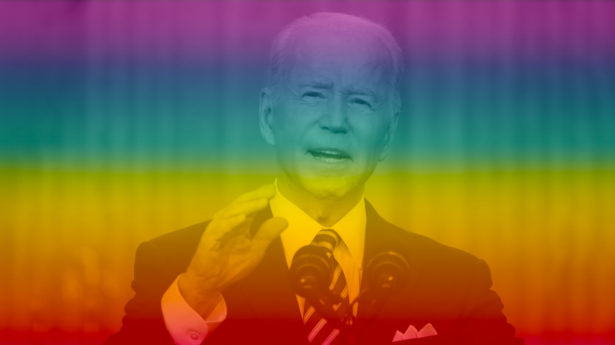The Unitarian Universalist Service Committee advances human rights through grassroots collaborations.
“They Call Me Words Like ‘Faggot’”: LGBTQ+ People Face Humiliation, Death in Many Nations

By Suhra Nahib on June 29, 2022
UUSC is republishing an article about the experiences of LGBTQ+ people in other nations, particularly Islamic countries. Names marked with an asterisk have been changed to protect identities.
Most countries worldwide are making signs of progress toward a more inclusive society, particularly with marriage equality and decriminalizing same-sex relations. However, there are still some Islamic countries where LGBTI people face punishment by law.
Jeremiah* from Saudi Arabia, now pursuing postgraduate studies in the United Kingdom, has no intention of going back to Saudi Arabia because he fears for his life.
“There are many factors. One of them is my sexual orientation. I cannot express myself,” Jeremiah said.
Growing up in Saudi Arabia, Jeremiah had to hide his beliefs and who he is. In Islamic countries, schools for girls and boys are divided, so boys and girls do not interact in any way.
“Growing up, because Saudi boys in the schools are separated from the girls, it’s not like people dated girls back when they were at school. So, at the time we kind of would have a romantic relationship with other boys,” said Jeremiah. “I’m not saying this was acceptable, but it was common to see that boys in Saudi would have some kind of romantic relationship with other boys.”
Unlike Western countries where there are sex education classes or movies that have sexual acts, in Islamic countries, sexual relations are not allowed to be shown in schools. There is no way for teenagers to learn and understand their sexuality. Most of them see this as a normal thing to do. Not only students do it; some male teachers have sex with students.
“But we all thought that this is just [a] stage, this is okay because there are no girls. So basically, this is kind of the only way to get the energy out. It’s just for fun,” said Jeremiah.
Many of boys get confused or they are not aware of their sexual orientation until they marry. And once they get married, it is hard for them to get out of the marriage because they have to consider their family reputation as well as their wife’s reputation. Jeremiah got married when he was 21 years old and had not finished his university studies at that time. But because many people in Islamic countries get married at a young age, he also thought that he was ready and that it was the right thing to do.
“Since I recognize that I do have attraction for both men and women, I thought it’s kind of a sin to have attraction towards men,” said Jeremiah. “So maybe marrying a woman would kind of help me, not cure the disease, but at least get rid of those thoughts of having attraction towards men.”
But soon enough he realized that the relationship was not the kind of relationship he was looking for.
Before his marriage, Jeremiah experienced depression and anxiety, and when he got married his condition worsened and he began having suicidal thoughts.
“So, I had a lot of issues concerning my sexual identity, my religious identity, and my mental state wasn’t very stable,” he said. Taking all this into consideration, he finally decided to come out to his friend. He planned to leave the country because he knew that he could not live in Saudi Arabia if he came out.
He left the country when he was 24 years old and he has no intention of going back, not only because he can now express his sexuality but also he no longer identifies as Muslim.
Despite Western countries being more open toward the LGBTQ+ community, some Muslim LGBTQ+ people face challenges outside of their country.
Hama Sarbast is an Iraqi activist who moved to Germany; he comes from a very radical Muslim family and he now identifies as a liberal Muslim. Living in Germany, Sarbast thought people would be more open to differences in sexual orientation, but he sees how LGBTQ+ people are discriminated against.
After seeing this discrimination, he decided to help members of the LGBTQ+ community, which caused a backlash against him.
“It’s really difficult and dangerous at the same time, especially in Berlin, because we have a very conservative community over here. I get personally discriminated [against]; they call me words like ‘faggot’. It’s difficult to be an activist or do this kind of [work] in this society,” said Sarbast.
Despite this, he still is working with the LGBTQ+ community in Germany. He understands that not many people are open-minded about homosexuality, or they believe that being homosexual is a choice.
“They don’t care. They think that homosexuality is just a decision,” said Sarbast.
The Muslim community in Germany, especially in Berlin, is very large. The reason why is that Germany has accepted—and is accepting—a lot of refugees from Islamic countries who are not able to live safely in their home countries. A lot of these refugees still follow Islam and its conservative beliefs. Many of the Islamic countries follow Sharia law, which says that sex outside of marriage is illegal. Same-sex marriage is not permitted, and same-sex intimacy is criminalized. The punishments, however, vary depending on the circumstances. But homosexual acts are punishable by death.
“We all get a warning before we get to the point of identifying ourselves as homosexual or bisexual. We didn’t have the time to get to that point to identify or, like, to come up with what we are. We get scared because anything, even small activities, are punishable by death. So religiously speaking or legally speaking, we get—everyone gets—scared,” said Jeremiah.
Being a member of the LGBTQ+ community in an Islamic country is very dangerous, especially now. Seventy countries deem same-sex sexual activities as a crime. Some of them—six are members of the United Nations—impose the death penalty. Brunei, a small Asian nation east of Singapore and west of the Philippines, made headlines in 2019 by announcing its new Islamic laws and making homosexuality and adultery capital crimes punishable by death.
Homosexuality became a crime punishable by death in Iran after the Islamic Revolution in 1979. In 2007, former president Mahmoud Ahmadinejad said during a visit to Columbia University, “In Iran, we don’t have homosexuals like in your country.”
Although Iran follows Sharia law as well, it permits individuals who are homosexual to change their gender. Clerics accept the idea of changing gender because they believe that that person is trapped in a body of the wrong sex. So, to avoid punishment or having to change their gender, many flee the country.
Most of those who flee the country are much happier despite facing some discrimination. They’d rather tolerate the discrimination than be punished for their sexual or gender orientation.

